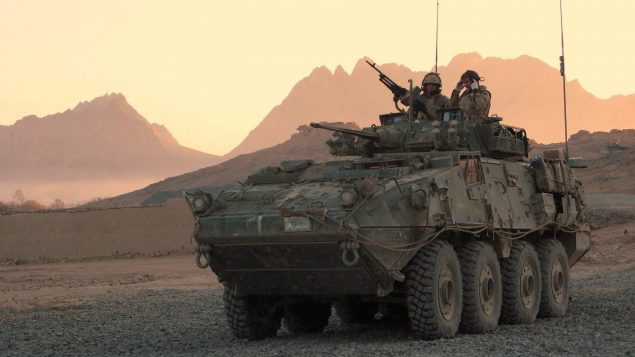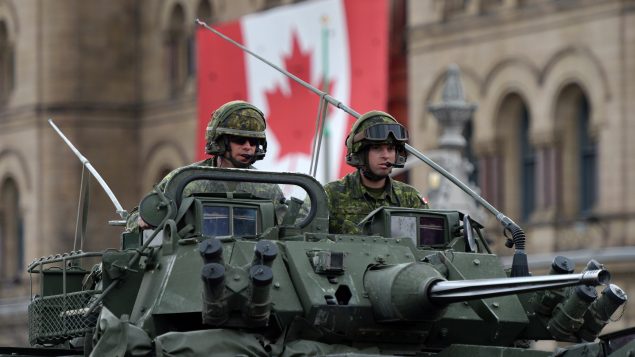Saudi Arabia has paid about $665 million on nearly $3.4 billion the oil-rich kingdom owed in late payments for Canadian-produced Light Armoured Vehicles (LAVs), according to financial results released by General Dynamics last week.
Jason W. Aiken, General Dynamics senior vice president and Chief Financial Officer, told analysts during a quarterly earnings call last Wednesday that the company, which produces the combat vehicles at its plant in London, Ontario, received the payment in January and expects another $665 million ($500 million US) later this year.
“The good news is that in the weeks following the end of the year through engagement with our principal customer, we have laid out a new path forward that rebaselines the program, including updated delivery schedules, a revised payment plan going forward and a number of contractual terms that provide greater assurance of payment on a go-forward basis,” Aiken said.
The company will continue to receive “scheduled progress payments on a newly established payment schedule” and “regular payments for product delivered in 2021 and beyond,” he added.
The Liberal government approved the controversial deal, signed by the previous Conservative government, to supply the Islamic Kingdom with hundreds of LAV 6.0 advanced combat vehicles used to transport troops on the battlefield in 2016.
The LAVs, wheeled military vehicles armed with various armaments, including automatic canons, machine guns, mortars and anti-tank missiles, are being produced by General Dynamics Land Systems – Canada (GDLS-C).
‘Canada is on the hook for this’

A Canadian LAV (light armoured vehicle) arrives to escort a convoy at a forward operating base near Panjwaii, Afghanistan at sunrise on Nov.26, 2006. A coalition of Canadian NGOs and advocacy groups is calling on Ottawa to cancel a $14-billion deal to supply a modernized version of the LAV to Saudi Arabia. (Bill Graveland/THE CANADIAN PRESS)
The roughly $14-billion contract was brokered and is being managed by the Canadian Commercial Corporation (CCC), a Crown corporation that helps Canadian companies in aerospace, defence, infrastructure and other sectors to land contracts with foreign governments.
That arrangement means that the exporting company acts as a subcontractor and gets paid by the federal government — once Ottawa receives payment from the foreign purchaser.
“Ultimately Canada is on the hook for this,” said Dave Perry, vice president of the Canadian Global Affairs Institute, a foreign policy think-tank.
“The Canadian government was not just an interested bystander in this dynamic because of the economic angle, it’s actually a party to the contract and therefore has a direct stake in making sure that the contract is executed properly.”
A spokesperson for CCC said the Crown corporation is bound by commercial confidentiality and is not able to disclose the details of specific contracts or their management.
“In general terms, as work progresses on all contracts, invoices are issued and managed under normal commercial terms,” the CCC said in an emailed statement.
Lessons for the federal government
Srdjan Vucetic, an associate professor of international relations at the University of Ottawa, said he believes the payment delays have resulted from the ongoing diplomatic dispute between Ottawa and Riyadh over Canadian concerns with human rights abuses in Saudi Arabia and the kingdom’s involvement in the bloody Yemen war.
The LAV deal offers some important lessons for the federal government, including that “human rights-abusing buyers are also likely to be contract-abusing,” Vucetic said.
The Saudi deal is a cautionary tale even from a purely business perspective, he added.
“I doubt that the Trudeau government will move to cancel the deal, especially since in November it shamelessly said that Canadian weapons are not being used to commit war crimes in Yemen,” Vucetic said.
“With a few different turns of Saudi, Middle East and U.S. politics this year, Canada and Saudi might well resolve their dispute, thus speeding up the payments as well as freeing almost 50 additional deals that are now under the moratorium.”
Conversely, alternative hypothetical political turns could also mean that Canada never sees large chunks of the money owed, he added.
The multibillion deal has created divisions among policy makers in Global Affairs Canada, the Prime Minister’s Office and even within the Canadian Labour Congress, Vucetic said.
“The public opinion is pretty much against this deal, but this parliament will probably be quiet about it,” Vucetic said.
In addition, there are other, smaller Canadian defence exports to the region that deserve attention, including top of the line Canadian sniper rifles, such as PGW Timberwolf and LRT-3, Vucetic said.
Canada already losing business to others
According to Global Affairs Canada statistics, Saudi Arabia was Canada’s largest non-U.S. destination for military exports in 2018, receiving approximately $1.2 billion in Canadian product.
But an internal memorandum written by high-ranking officials at Global Affairs Canada and International Trade last fall warns that tensions between Ottawa and Riyadh and the ongoing moratorium on the issuance of new permits are already having a negative impact on Canadian exporters.
Canadian companies exporting military goods that are readily available elsewhere are being excluded from the Saudi bidding processes, and that business is being lost to foreign competitors, the redacted memo says.
“Engagement by departmental officials with 20 companies that have a history of exporting to KSA (Kingdom of Saudi Arabia) suggests that approximately $2 billion in trade has been affected since August 2018,” the memo says. “The open-ended nature of Canada’s moratorium on new export permits, and the lack of identified conditions that would allow a resumption of permit issuance, present a high commercial risk for Canadian companies.”
The memo claims that “there is no evidence or credible reporting that would link any Canadian exports (eg. ground vehicles, sniper riles) to contraventions of international humanitarian law in Yemen” while military exports by a country, whose name has been redacted out “can be directly traced to the Saudi coalition air campaign and naval blockade.”
Despite the moratorium on new export permits announced in 2018, Global Affairs Canada has “assessed and processed a further 48 permit applications for exports of controlled goods to KSA on a case-by-case basis under its standard robust risk assessment process,” the memo says, adding that “those permits have been deemed ready for approval by officials.”
But the memo also warns the minister against making decisions on issuing arms export permits “based on irrelevant considerations” that are “arbitrary and capricious.”
“Certainly you can read this and think that the way the government has handled this particular file has left the impression that some of its decisions have been arbitrary and capricious,” Perry said.
The controversy and the political fallout from the LAV deal have created a considerable degree of uncertainty and doubt about the government’s ability to issue export permits even when exporters follow the government’s own rules down to the letter, Perry said.
Officials at Global Affairs Canada could not be reached for comment in time for publication.







For reasons beyond our control, and for an undetermined period of time, our comment section is now closed. However, our social networks remain open to your contributions.